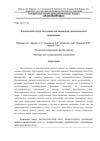 January 2024 in “Zenodo (CERN European Organization for Nuclear Research)”
January 2024 in “Zenodo (CERN European Organization for Nuclear Research)” The conclusion is that certain traits, including perceived facial aging and BMI, are linked to perceived youthfulness differently in men and women.
 January 2024 in “Zenodo (CERN European Organization for Nuclear Research)”
January 2024 in “Zenodo (CERN European Organization for Nuclear Research)” The conclusion is that certain traits, including perceived facial aging and BMI, are linked to how youthful people look, with some differences between males and females.
 9 citations,
March 2022 in “Antioxidants”
9 citations,
March 2022 in “Antioxidants” Synthetic antioxidants are effective, cheap, and stable, with some like zinc and cholecalciferol reducing child and cancer deaths, but the safety of additives like BHA, BHT, TBHQ, and PEG needs more research.
 1 citations,
July 2023 in “Frontiers in Immunology”
1 citations,
July 2023 in “Frontiers in Immunology” Oxidative stress and immune dysfunction are linked to both Hashimoto's thyroiditis and polycystic ovary syndrome, with diet and specific treatments important for managing these conditions.
 21 citations,
January 2014 in “Dermatology Research and Practice”
21 citations,
January 2014 in “Dermatology Research and Practice” Hair and serum levels of zinc, copper, and iron are similar in people with alopecia areata and healthy individuals.
 May 2024 in “Portuguese journal of dermatology and venereology”
May 2024 in “Portuguese journal of dermatology and venereology” Reassurance and counseling are key in managing acute telogen effluvium, with supplements possibly offering a placebo effect.
 September 2020 in “Benha Journal of Applied Sciences”
September 2020 in “Benha Journal of Applied Sciences” Patients with Alopecia Areata have lower levels of zinc and biotin than healthy individuals.
17 citations,
September 2000 in “Journal of dermatology” A baby with a rare metabolic disorder developed a rash not cured by zinc alone, likely due to both zinc and amino acid deficiencies.
April 2019 in “Journal of the Endocrine Society” An over-the-counter vitamin/mineral supplement improved hair loss and blood sugar control in a woman with non-classic 11-hydroxylase deficiency.
 14 citations,
April 2000 in “Animal Science/Animal science”
14 citations,
April 2000 in “Animal Science/Animal science” Nutrients like vitamins, copper, zinc, and amino acids are crucial for healthy hair and wool growth.
 September 2018 in “International Journal of Dermatology”
September 2018 in “International Journal of Dermatology” People with alopecia areata often have lower levels of zinc and vitamin D.
 February 2024 in “Agroèkoinfo”
February 2024 in “Agroèkoinfo” Environmental factors and grain products affect hair loss, with low cobalt in hair possibly predicting the condition.
 December 2023 in “Sains Malaysiana”
December 2023 in “Sains Malaysiana” The enzyme Rand protease works well for leather dehairing and its stability is important, with Leu75 playing a key role.
 June 2001 in “Annals of Internal Medicine”
June 2001 in “Annals of Internal Medicine” The document concludes that more research is needed on the hepatitis B vaccine's side effects and the effectiveness of certain treatments for specific diseases.
 14 citations,
August 2016 in “Journal of nanomedicine research”
14 citations,
August 2016 in “Journal of nanomedicine research” Zinc oxide nanoparticle biscuits improved growth and health in zinc-deficient rats without toxicity.
 1 citations,
July 2012 in “EFSA journal”
1 citations,
July 2012 in “EFSA journal” KF2BL20 does not have proven benefits for maintaining normal hair.
 16 citations,
April 2012 in “Journal of mammalogy”
16 citations,
April 2012 in “Journal of mammalogy” Young female Australian fur seals are losing hair due to low tyrosine and zinc levels and high pollution exposure.
 56 citations,
January 2013 in “International journal of trichology”
56 citations,
January 2013 in “International journal of trichology” Zinc supplements may be needed to treat hair loss in hypothyroidism.
August 2022 in “International Journal of Health Sciences (IJHS)” The combined treatment significantly improved hair growth and thickness compared to the control group.
 September 2020 in “Benha Veterinary Medical Journal”
September 2020 in “Benha Veterinary Medical Journal” Sheep with skin diseases often have lower levels of certain trace elements and vitamin A, and higher oxidative stress and immunoglobulin E levels.
33 citations,
November 1999 in “The Veterinary clinics of North America. Small animal practice/Veterinary clinics of North America. Small animal practice” Dogs with zinc-responsive dermatosis need zinc supplements or dietary changes for treatment.
 1 citations,
May 2021 in “Journal of Cosmetic Dermatology”
1 citations,
May 2021 in “Journal of Cosmetic Dermatology” Cosmetic foam product reduces hair loss and increases hair density in men.
 3 citations,
June 2019 in “Journal of Bangladesh Society of Physiologist”
3 citations,
June 2019 in “Journal of Bangladesh Society of Physiologist” People with hair loss often have lower levels of zinc and copper in their blood.
 January 2016 in “American Journal of Clinical and Experimental Medicine”
January 2016 in “American Journal of Clinical and Experimental Medicine” Lower zinc levels in hair are linked to more severe male pattern baldness, but blood zinc levels don't show this link. Age also increases baldness severity.
 January 2022 in “United Research Forum eBooks”
January 2022 in “United Research Forum eBooks” Picky eating in children is linked to lower zinc levels and various nutritional deficiencies.
 68 citations,
February 1996 in “Obesity Surgery”
68 citations,
February 1996 in “Obesity Surgery” Taking zinc sulphate stopped and reversed hair loss in patients after weight loss surgery.
 11 citations,
November 2022 in “JAMA dermatology”
11 citations,
November 2022 in “JAMA dermatology” Some nutritional supplements may help treat hair loss with generally mild side effects.
January 2019 in “Türkiye klinikleri dermatoloji dergisi” Low levels of iron, ferritin, zinc, and folic acid may contribute to hair loss in women.
January 2022 in “Indian journal of paediatric dermatology” Children with early graying hair might have lower levels of certain nutrients like zinc, magnesium, and Vitamin B12.
 August 2024 in “Journal of Cosmetic Dermatology”
August 2024 in “Journal of Cosmetic Dermatology” Telogen effluvium is linked to deficiencies in iron, vitamin B12, and thyroid function.
























